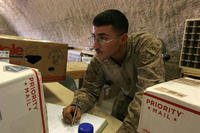I had the opportunity yesterday to listen to a teleconference sponsored by the Defense Centers of Excellence for Psychological Health and Traumatic Brain Injury about life after deployment, reintegrating with your family and life outside a war zone.
What I learned is that you can’t talk about life after deployment if you don’t talk about life during deployment.
Being deployed in a war zone teaches you to “enjoy the simple things,” said the presenters, each of whom had served in Iraq.
Coming home and realizing that people are concerned with things that are really frivolous is a challenge, said Dr. James Bender, who served in Iraq from June 2008 to June 2009 as a brigade psychologist for 1st Cavalry Division’s 4th Brigade Combat Team.
“I was really annoyed at other people’s problems,” Dr. Bender said.
Retired Army Lt. Col. Erin C. McLaughlin said that it takes time to readjust to normal life, including multitasking, instead of focusing on a single mission, and even looking at how bright and colorful the world outside of Iraq is.
“Everything over there is brown. The colors [here] are almost sensory overload,” Lt. Col. McLaughlin said.
Being deployed also teaches you to be honest – sometimes brutally so, said U.S. Navy Lt. Chris Pedersen.
During his deployment, Lt. Pedersen’s wife moved across the country to be with her parents so she didn’t join with the other spouses in sending care packages.
“It hurt me that my friends were receiving those things and I wasn’t,” Pedersen said. “I was crushed when mail call came and there was no mail.”
When he got home, Pedersen told his wife how that had “bothered him,” he said.
Problems at home don’t stay at home while servicemembers are deployed, said Air Force Lt. Col. Christopher Robinson, senior executive director of psychological health for the Defense Centers of Excellence for Psychological Health and Traumatic Brain Injury, who served as a mental health professional in Iraq.
With the time difference, their night is our day and vice-versa, Lt. Col. Robinson said, so sometimes soldiers wouldn’t get the proper rest.
“We were always concerned of anyone overusing their telephone because we wanted to make sure that soldiers got enough sleep,” Robinson said.
Having contact with the family at home often kept soldiers grounded but there were times when the problems at home could overwhelm the deployed servicemember, he said.
Doing too much, and having different expectations upon returning home can also create problems, Pedersen said.
“I tried to do too much with the kids. Too much for my wife,” he said.
Pedersen had longed for the excitement of his kids but being at home “was really noisy,” he said.
Pedersen’s squadron was deployed to Iraq only 45 days after returning from a six-month at-sea rotation. By the time he got home from Iraq, his wife “needed a break,” he said, but that meant he suddenly had the kids full time.
It was hard but he got through it, he said.
“I went through an emotional high and then an emotional low,” Pedersen said. “The best thing was getting back to work.”




















